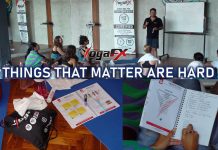Coaching helps people to focus on the ‘here and now. Coaches the world over use different models to facilitate this learning experience for clients. Neuro-linguistic programming is one technique that is highly beneficial for one’s coaching practice. NLP is about learning the language of the brain. This is why coaches who learn NLP techniques are even more likely to create success stories in their coaching practice.
What is Neuro-Linguistic Programming?
NLP is the use of psychology with sound strategies and techniques a person can use to create the results they desire. Neuro (neurology) and Linguistic (language) programs (patterns, themes) are about the language of the brain, and knowing NLP gives an individual the power to reprogram thinking using the many techniques of NLP. This brings effective changes to transform lives.
The use of NLP has created astounding results in the lives of all. NLP brings in a tremendous change in the way a coach works with the self and the client. A coach learns winning tactics that bring greater coaching success. A successful coach with the knowledge of NLP is equipped to create a business module for themself while serving the world at large. To understand this better, we list 5 techniques among the many NLP techniques you can use to elevate your coaching practice.
1. Anchoring
This Neuro-Linguistic Programming technique is useful to regenerate a resourceful emotion. You work on recreating the emotion while associating it with physical activity. Anchoring creates an association between the emotion and the chosen physical action.
For example, a coach may ask the client to choose a positive resourceful emotion such as happiness. The client then needs to decide the action that is associated with the body. It can be as simple as touching one’s finger. Once the client decides the anchor, he can revisit the emotion and experience it fully.
2. Belief Change
Every person has a set of self-limiting beliefs. However, many beliefs turn into a habit. Not all beliefs positively serve us. NLP techniques take a deeper look at the belief while understanding the negative implications.
For example, a belief can stem from any statement you have said repeatedly over time:
- I am not good at dancing
- I am a bad cook.
The beliefs a client may hold about self and the world might be damaging and untrue. If a client believes ‘he cannot, he certainly won’t. As coaches, the use of Neuro-Linguistic Programming techniques such as Presuppositions is useful to bring a change within the client by demystifying with curiosity, observations, and inquiring on the client’s current state to move to the desired state. The coach uses these techniques to nudge the client to a space of self-exploration. Here, the client develops the capacity to study his current state of mind and assumptions and learns to make changes to expand his frame of reference.
3. Mirroring and Rapport
Coaches have the primary responsibility of creating a space where the client learns to trust their own self. Mirroring and rapport are important NLP techniques coaches can use to break the ice and establish a better connection with the client. An NLP Coach is trained to mirror the other person’s behavior. The fine art of being subtle is combined with the ability to converse – this comes naturally to NLP coaches. It establishes greater rapport and trust as the coach mirrors the client’s body language, gestures, voice, and words.
4. Reframing Thoughts
Coaches often face multiple challenges in their client-coaching journey. The NLP technique of reframing gives a coach sound knowledge to change certain emotions towards an optimistic outcome. A coach may use this technique to increase or decrease the presence of emotions with their clients.
For example, a client may approach a coach and express concern over his body image. He may use statements such as, “I don’t want to be fat.” The coach explores to reframe the client’s thinking by inquiring about his goal. Here, the client then realizes his goal is to be fit.
5. Creative Visualization (Meditation, Hypnosis)
NLP techniques include the study of the art of persuasion. A coach learns to work with clients and remove their limiting beliefs along with conflicts within the self, and habits that do not serve them well. A coach may use the techniques of mindfulness to work with clients around self-acceptance. He may also make a client explore quick visualization techniques towards successful outcomes.
With these NLP techniques, coaches empower clients to find their way towards actions.
CLICK HERE For More Course Inclusions and Our Main Event![]()

















































